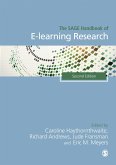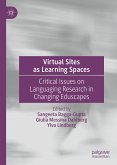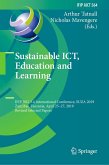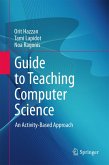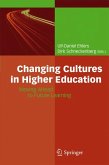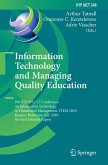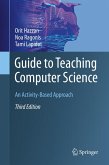The SAGE Handbook of E-learning Research (eBook, PDF)
Redaktion: Haythornthwaite, Caroline; Meyers, Eric M.; Fransman, Jude; Andrews, Richard N. L.
100,95 €
100,95 €
inkl. MwSt.
Sofort per Download lieferbar

50 °P sammeln
100,95 €
Als Download kaufen

100,95 €
inkl. MwSt.
Sofort per Download lieferbar

50 °P sammeln
Jetzt verschenken
Alle Infos zum eBook verschenken
100,95 €
inkl. MwSt.
Sofort per Download lieferbar
Alle Infos zum eBook verschenken

50 °P sammeln
The SAGE Handbook of E-learning Research (eBook, PDF)
Redaktion: Haythornthwaite, Caroline; Meyers, Eric M.; Fransman, Jude; Andrews, Richard N. L.
- Format: PDF
- Merkliste
- Auf die Merkliste
- Bewerten Bewerten
- Teilen
- Produkt teilen
- Produkterinnerung
- Produkterinnerung

Bitte loggen Sie sich zunächst in Ihr Kundenkonto ein oder registrieren Sie sich bei
bücher.de, um das eBook-Abo tolino select nutzen zu können.
Hier können Sie sich einloggen
Hier können Sie sich einloggen
Sie sind bereits eingeloggt. Klicken Sie auf 2. tolino select Abo, um fortzufahren.

Bitte loggen Sie sich zunächst in Ihr Kundenkonto ein oder registrieren Sie sich bei bücher.de, um das eBook-Abo tolino select nutzen zu können.
The new edition of The SAGE Handbook of E-Learning Research retains the original effort of the first edition by focusing on research while capturing the leading edge of e-learning development and practice. Chapters focus on areas of development in e-learning technology, theory, practice, pedagogy and method of analysis.
Covering the full extent of e-learning can be a challenge as developments and new features appear daily. The editors of this book meet this challenge by including contributions from leading researchers in areas that have gained a sufficient critical mass to provide reliable…mehr
- Geräte: PC
- mit Kopierschutz
- eBook Hilfe
- Größe: 6.23MB
Andere Kunden interessierten sich auch für
![The SAGE Handbook of E-learning Research (eBook, ePUB) The SAGE Handbook of E-learning Research (eBook, ePUB)]() The SAGE Handbook of E-learning Research (eBook, ePUB)100,95 €
The SAGE Handbook of E-learning Research (eBook, ePUB)100,95 €![Virtual Sites as Learning Spaces (eBook, PDF) Virtual Sites as Learning Spaces (eBook, PDF)]() Virtual Sites as Learning Spaces (eBook, PDF)73,95 €
Virtual Sites as Learning Spaces (eBook, PDF)73,95 €![Sustainable ICT, Education and Learning (eBook, PDF) Sustainable ICT, Education and Learning (eBook, PDF)]() Sustainable ICT, Education and Learning (eBook, PDF)44,95 €
Sustainable ICT, Education and Learning (eBook, PDF)44,95 €![Guide to Teaching Computer Science (eBook, PDF) Guide to Teaching Computer Science (eBook, PDF)]() Orit HazzanGuide to Teaching Computer Science (eBook, PDF)54,95 €
Orit HazzanGuide to Teaching Computer Science (eBook, PDF)54,95 €![Changing Cultures in Higher Education (eBook, PDF) Changing Cultures in Higher Education (eBook, PDF)]() Changing Cultures in Higher Education (eBook, PDF)73,95 €
Changing Cultures in Higher Education (eBook, PDF)73,95 €![Information Technology and Managing Quality Education (eBook, PDF) Information Technology and Managing Quality Education (eBook, PDF)]() Information Technology and Managing Quality Education (eBook, PDF)40,95 €
Information Technology and Managing Quality Education (eBook, PDF)40,95 €![Guide to Teaching Computer Science (eBook, PDF) Guide to Teaching Computer Science (eBook, PDF)]() Orit HazzanGuide to Teaching Computer Science (eBook, PDF)44,95 €
Orit HazzanGuide to Teaching Computer Science (eBook, PDF)44,95 €-
-
-
The new edition of The SAGE Handbook of E-Learning Research retains the original effort of the first edition by focusing on research while capturing the leading edge of e-learning development and practice. Chapters focus on areas of development in e-learning technology, theory, practice, pedagogy and method of analysis.
Covering the full extent of e-learning can be a challenge as developments and new features appear daily. The editors of this book meet this challenge by including contributions from leading researchers in areas that have gained a sufficient critical mass to provide reliable results and practices.
The 25 chapters are organised into six key areas:
1. THEORY
2. LITERACY & LEARNING
3. METHODS & PERSPECTIVES
4. PEDAGOGY & PRACTICE
5. BEYOND THE CLASSROOM
6. FUTURES
Covering the full extent of e-learning can be a challenge as developments and new features appear daily. The editors of this book meet this challenge by including contributions from leading researchers in areas that have gained a sufficient critical mass to provide reliable results and practices.
The 25 chapters are organised into six key areas:
1. THEORY
2. LITERACY & LEARNING
3. METHODS & PERSPECTIVES
4. PEDAGOGY & PRACTICE
5. BEYOND THE CLASSROOM
6. FUTURES
Dieser Download kann aus rechtlichen Gründen nur mit Rechnungsadresse in A, D ausgeliefert werden.
Produktdetails
- Produktdetails
- Verlag: SAGE Publications
- Seitenzahl: 606
- Erscheinungstermin: 23. Mai 2016
- Englisch
- ISBN-13: 9781473955004
- Artikelnr.: 45099765
- Verlag: SAGE Publications
- Seitenzahl: 606
- Erscheinungstermin: 23. Mai 2016
- Englisch
- ISBN-13: 9781473955004
- Artikelnr.: 45099765
- Herstellerkennzeichnung Die Herstellerinformationen sind derzeit nicht verfügbar.
Caroline Haythornthwaite is Professor, School of Library, Archival and Information Studies, the iSchool at The University of British Columbia, where she was Director from 2010 to 2015. She joined UBC in 2010 after 14 years at the University of Illinois at Urbana-Champaign, and 10 years in the computing industry. She has an international reputation in research on e-learning, virtual community, and distributed knowledge from a social network analysis perspective, and the impact of computer media and the Internet on work, learning and social interaction. Current initiatives includes her role as a founding member of the Society for Learning Analytics Research (http: //solaresearch.org/); research on social media and learning supported by the Social Science and Humanities Research Council of Canada; and continued examination of motivations to contribute to open, online initiatives. Major publications include of E-learning Theory and Practice (2011, with Richard Andrews), The SAGE Handbook of E-learning Research (2007, with Richard Andrews), The Internet in Everyday Life (2002, with Barry Wellman), and recent journal special issues on 'New Media, New Literacies, and New Forms of Learning', International Journal of Learning and Media (2014, with Eric Meyers) and Learning Analytics, American Behavioral Scientist (2013, with Maarten de Laat and Shane Dawson). Further information can be found at http: //haythorn.wordpress.com/. Richard Andrews has held professorial and senior management posts at the University of York, UCL Institute of Education and Anglia Ruskin University. He works across the fields of argumentation, poetics, rhetoric, writing development and e-learning methodologies. He is the co-author with Caroline Haythornthwaite of E-learning Theory and Practice (Sage) and has edited an issue of Learning, Media and Technology on rhetoric in the digital age with Jude Fransman. He is currently working on a prosody of free verse. Jude Fransman holds a Leverhulme Early Career Fellowship at the Institute of Educational Technology in the Open University. Her dual research interests focus on academic literacies in the 'Digital University' and practitioner engagement with research. She is currently leading a project to explore civil society practitioners' use of digital resources to engage with research (http: //engagingresearch.net ). She also coordinates an ESRC-funded seminar series on the 'politics of evidence' in research partnerships between universities and international NGOs (http: //rethinkingresearchpartnerships.com). She was a previous winner of a Newer Researcher's Award from the Society of Research into Higher Education (SRHE) which supported a study on academic identity in the digital university (http: //www.srhe.ac.uk/research/newer_researchers_reports.asp). She has conducted consultancies for a variety of international organisations and continues to act as a special advisor on literacy for UNESCO. Eric Meyers is an Assistant Professor at the School of Library, Archival and Information Studies--The iSchool@UBC. His research, at the intersection of information science and the learning sciences, explores how young people engage socially with digital information systems as they work, learn, and play. His recent work has focused on how crafting and prototyping activities in informal learning settings, specifically Maker Camps and library-based coding and crafting programs, support the development of design literacies and computational thinking, the skills and attitudes that facilitate understanding of today′s complex information and communication technologies. He recently edited journal special issues on "Digital Literacies in Informal Contexts" in Learning, Media and Technology (2013, with Ruth Small and Ingrid Erickson) and "New Media, New Literacies, and New Forms of Learning" in International Journal of Learning and Media (2014, with Caroline Haythorthwaite). His research, teaching and service have garnered international awards in the field of Library and Information Science, including the Jesse Shera Award for Distinguished Published Research (2008), the Eugene Garfield Dissertation Prize (2012), and the Pratt-Severn Faculty Innovation Award (2015).
1. Introduction - Caroline Haythornthwaite, Richard Andrews, Jude Fransman
& Eric Meyers
Part 1 THEORY
2. Online pedagogy from the learning sciences perspective - Christopher
Hoadley
3. Networked learning - Chris Jones & Maarten de Laat
4. A theory of learning for the mobile age - Mike Sharples, Josie Taylor &
Giasemi Vavoula
5. Posthumanism and research in digital education - Sian Bayne
PART 2 LITERACY & LEARNING
6. Reshaping rhetorical space: elearning through online asynchronous
discussion - Terry Locke
7. Liber ludens: games, play and learning - Andrew Burn
8. Multimodality in virtual learning environments: exploring traces of the
page in designs of screens - Myrrh Domingo
9. Second language learning online - Carol A. Chapelle
10. Multilingualism and e-learning - Janina Brutt-Griffler and Namsook Kim
PART 3 METHODS & PERSPECTIVES
11. The ethics of learning and technology research - Rebecca Eynon, Ralph
Schroeder & Jenny Fry
12. Learning analytics and the imperative for theory driven research - Tim
Rogers, Shane Dawson & Dragan Gasevic
13. Social network analytic perspective on e-learning - Caroline
Haythornthwaite, Maarten de Laat & Bieke Schreurs
14. Analyzing learning in online discussions - Alyssa Wise & Trena Paulus
15. Multimodal longitudinal journaling - Lesley Jane Gourlay & Martin
Oliver
PART 4 PEDAGOGY & PRACTICE
16. Information literacy and information practice - Drew Whitworth
17. Design for e-learning - Lori Lockyer, Shirley Agostinho & Sue Bennett
18. Social media and learning - Drew Paulin & Sarah Gilbert
19. Games and learning - Richard Halverson & Constance Steinkuehler
20. Pedagogies in virtual worlds - Maggi Savin-Baden & Gemma Tombs
PART 5 BEYOND THE CLASSROOM
21. Literacy and the digital university - Robin Goodfellow & Mary R. Lea
22. Promoting policy uptake for open educational resources and open
practices - Grainne C. Conole, Giles Pepler, Paul Bacsich, Brenda Padilla &
Terese Bird
23. E-learning and libraries - Nazlin Bhimani
24. E-learning in museums - Rhiannon Looseley & Juno Rae
25. Designing for lifelong learning - John Cook
PART 6 FUTURES
26. The future of e-learning - Jon Dron & Terry Anderson
& Eric Meyers
Part 1 THEORY
2. Online pedagogy from the learning sciences perspective - Christopher
Hoadley
3. Networked learning - Chris Jones & Maarten de Laat
4. A theory of learning for the mobile age - Mike Sharples, Josie Taylor &
Giasemi Vavoula
5. Posthumanism and research in digital education - Sian Bayne
PART 2 LITERACY & LEARNING
6. Reshaping rhetorical space: elearning through online asynchronous
discussion - Terry Locke
7. Liber ludens: games, play and learning - Andrew Burn
8. Multimodality in virtual learning environments: exploring traces of the
page in designs of screens - Myrrh Domingo
9. Second language learning online - Carol A. Chapelle
10. Multilingualism and e-learning - Janina Brutt-Griffler and Namsook Kim
PART 3 METHODS & PERSPECTIVES
11. The ethics of learning and technology research - Rebecca Eynon, Ralph
Schroeder & Jenny Fry
12. Learning analytics and the imperative for theory driven research - Tim
Rogers, Shane Dawson & Dragan Gasevic
13. Social network analytic perspective on e-learning - Caroline
Haythornthwaite, Maarten de Laat & Bieke Schreurs
14. Analyzing learning in online discussions - Alyssa Wise & Trena Paulus
15. Multimodal longitudinal journaling - Lesley Jane Gourlay & Martin
Oliver
PART 4 PEDAGOGY & PRACTICE
16. Information literacy and information practice - Drew Whitworth
17. Design for e-learning - Lori Lockyer, Shirley Agostinho & Sue Bennett
18. Social media and learning - Drew Paulin & Sarah Gilbert
19. Games and learning - Richard Halverson & Constance Steinkuehler
20. Pedagogies in virtual worlds - Maggi Savin-Baden & Gemma Tombs
PART 5 BEYOND THE CLASSROOM
21. Literacy and the digital university - Robin Goodfellow & Mary R. Lea
22. Promoting policy uptake for open educational resources and open
practices - Grainne C. Conole, Giles Pepler, Paul Bacsich, Brenda Padilla &
Terese Bird
23. E-learning and libraries - Nazlin Bhimani
24. E-learning in museums - Rhiannon Looseley & Juno Rae
25. Designing for lifelong learning - John Cook
PART 6 FUTURES
26. The future of e-learning - Jon Dron & Terry Anderson
1. Introduction - Caroline Haythornthwaite, Richard Andrews, Jude Fransman
& Eric Meyers
Part 1 THEORY
2. Online pedagogy from the learning sciences perspective - Christopher
Hoadley
3. Networked learning - Chris Jones & Maarten de Laat
4. A theory of learning for the mobile age - Mike Sharples, Josie Taylor &
Giasemi Vavoula
5. Posthumanism and research in digital education - Sian Bayne
PART 2 LITERACY & LEARNING
6. Reshaping rhetorical space: elearning through online asynchronous
discussion - Terry Locke
7. Liber ludens: games, play and learning - Andrew Burn
8. Multimodality in virtual learning environments: exploring traces of the
page in designs of screens - Myrrh Domingo
9. Second language learning online - Carol A. Chapelle
10. Multilingualism and e-learning - Janina Brutt-Griffler and Namsook Kim
PART 3 METHODS & PERSPECTIVES
11. The ethics of learning and technology research - Rebecca Eynon, Ralph
Schroeder & Jenny Fry
12. Learning analytics and the imperative for theory driven research - Tim
Rogers, Shane Dawson & Dragan Gasevic
13. Social network analytic perspective on e-learning - Caroline
Haythornthwaite, Maarten de Laat & Bieke Schreurs
14. Analyzing learning in online discussions - Alyssa Wise & Trena Paulus
15. Multimodal longitudinal journaling - Lesley Jane Gourlay & Martin
Oliver
PART 4 PEDAGOGY & PRACTICE
16. Information literacy and information practice - Drew Whitworth
17. Design for e-learning - Lori Lockyer, Shirley Agostinho & Sue Bennett
18. Social media and learning - Drew Paulin & Sarah Gilbert
19. Games and learning - Richard Halverson & Constance Steinkuehler
20. Pedagogies in virtual worlds - Maggi Savin-Baden & Gemma Tombs
PART 5 BEYOND THE CLASSROOM
21. Literacy and the digital university - Robin Goodfellow & Mary R. Lea
22. Promoting policy uptake for open educational resources and open
practices - Grainne C. Conole, Giles Pepler, Paul Bacsich, Brenda Padilla &
Terese Bird
23. E-learning and libraries - Nazlin Bhimani
24. E-learning in museums - Rhiannon Looseley & Juno Rae
25. Designing for lifelong learning - John Cook
PART 6 FUTURES
26. The future of e-learning - Jon Dron & Terry Anderson
& Eric Meyers
Part 1 THEORY
2. Online pedagogy from the learning sciences perspective - Christopher
Hoadley
3. Networked learning - Chris Jones & Maarten de Laat
4. A theory of learning for the mobile age - Mike Sharples, Josie Taylor &
Giasemi Vavoula
5. Posthumanism and research in digital education - Sian Bayne
PART 2 LITERACY & LEARNING
6. Reshaping rhetorical space: elearning through online asynchronous
discussion - Terry Locke
7. Liber ludens: games, play and learning - Andrew Burn
8. Multimodality in virtual learning environments: exploring traces of the
page in designs of screens - Myrrh Domingo
9. Second language learning online - Carol A. Chapelle
10. Multilingualism and e-learning - Janina Brutt-Griffler and Namsook Kim
PART 3 METHODS & PERSPECTIVES
11. The ethics of learning and technology research - Rebecca Eynon, Ralph
Schroeder & Jenny Fry
12. Learning analytics and the imperative for theory driven research - Tim
Rogers, Shane Dawson & Dragan Gasevic
13. Social network analytic perspective on e-learning - Caroline
Haythornthwaite, Maarten de Laat & Bieke Schreurs
14. Analyzing learning in online discussions - Alyssa Wise & Trena Paulus
15. Multimodal longitudinal journaling - Lesley Jane Gourlay & Martin
Oliver
PART 4 PEDAGOGY & PRACTICE
16. Information literacy and information practice - Drew Whitworth
17. Design for e-learning - Lori Lockyer, Shirley Agostinho & Sue Bennett
18. Social media and learning - Drew Paulin & Sarah Gilbert
19. Games and learning - Richard Halverson & Constance Steinkuehler
20. Pedagogies in virtual worlds - Maggi Savin-Baden & Gemma Tombs
PART 5 BEYOND THE CLASSROOM
21. Literacy and the digital university - Robin Goodfellow & Mary R. Lea
22. Promoting policy uptake for open educational resources and open
practices - Grainne C. Conole, Giles Pepler, Paul Bacsich, Brenda Padilla &
Terese Bird
23. E-learning and libraries - Nazlin Bhimani
24. E-learning in museums - Rhiannon Looseley & Juno Rae
25. Designing for lifelong learning - John Cook
PART 6 FUTURES
26. The future of e-learning - Jon Dron & Terry Anderson

